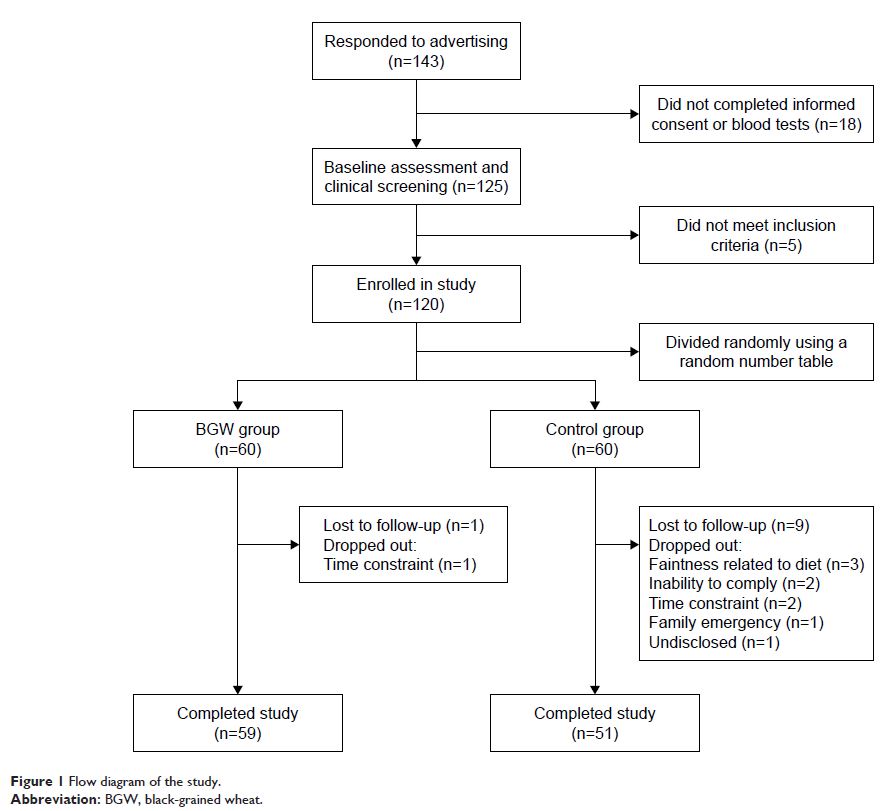108985
论文已发表
注册即可获取德孚的最新动态
IF 收录期刊
- 3.4 Breast Cancer (Dove Med Press)
- 3.2 Clin Epidemiol
- 2.6 Cancer Manag Res
- 2.9 Infect Drug Resist
- 3.7 Clin Interv Aging
- 5.1 Drug Des Dev Ther
- 3.1 Int J Chronic Obstr
- 6.6 Int J Nanomed
- 2.6 Int J Women's Health
- 2.9 Neuropsych Dis Treat
- 2.8 OncoTargets Ther
- 2.0 Patient Prefer Adher
- 2.2 Ther Clin Risk Manag
- 2.5 J Pain Res
- 3.0 Diabet Metab Synd Ob
- 3.2 Psychol Res Behav Ma
- 3.4 Nat Sci Sleep
- 1.8 Pharmgenomics Pers Med
- 2.0 Risk Manag Healthc Policy
- 4.1 J Inflamm Res
- 2.0 Int J Gen Med
- 3.4 J Hepatocell Carcinoma
- 3.0 J Asthma Allergy
- 2.2 Clin Cosmet Investig Dermatol
- 2.4 J Multidiscip Healthc

在饮食中增加黑粒小麦的摄入可改善 2 型糖尿病患者的血糖控制和炎症状况:一项随机对照试验
Authors Liu Y, Qiu J, Yue Y, Li K, Ren G
Received 11 September 2017
Accepted for publication 18 December 2017
Published 12 February 2018 Volume 2018:14 Pages 247—256
DOI https://doi.org/10.2147/TCRM.S151424
Checked for plagiarism Yes
Review by Single-blind
Peer reviewers approved by Dr Amy Norman
Peer reviewer comments 2
Editor who approved publication: Professor Deyun Wang
Introduction: Although black-grained wheat (BGW) is recognized as a nutritional
food for humans in China, it has yet to be utilized well for industrial
applications, which can be attributed to the limited research data available on
its health benefits. Thus, the hypothesis was tested that a daily substitution
of BGW for a partial staple food would improve glycemia and inflammatory
profile of type 2 diabetes mellitus (T2DM) patients by a randomized controlled
trial.
Materials and methods: A total of 120 patients were randomly divided
between control group (diet control and nutritional education) and BGW group
(daily substitution of BGW for a partial staple food).
Results: Based on the significant difference between BGW and
control groups (P <0.05), the primary outcomes
were that BGW treatment in diet resulted in a significant lowering of glycated
albumin (GA, 18.05 to 16.06 mmol/L) level in T2DM patients after a 5-week
intervention, and this treatment regimen was much more efficient than the
strategy of diet control alone. In addition, BGW supplementation prevented
the increase in tumor necrosis factor (TNF)-α and interleukin (IL)-6 induced by
T2DM. There were no significant differences in blood glucose, glycated
hemoglobin or insulin levels between the 2 groups. The subgroup analyses of the
BGW daily intake showed that, except the TNF-α, significant improvements in GA
and IL-6 were observed when the BGW intake dose was >69 g/day.
Conclusion: These findings support the hypothesis that BGW may
improve glycemia and the inflammatory profile in T2DM patients.
Keywords: black-grained
wheat, glycated albumin, tumor necrosis factor-α, interleukin-6
